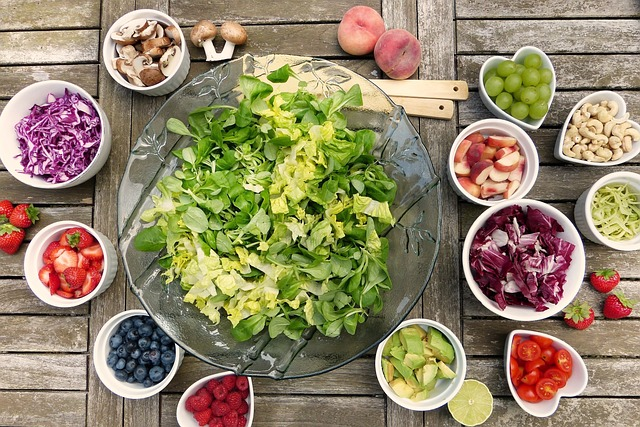Vegan Globetrotter is supported by our audience. When you purchase through one of our links, we may earn a small affiliate commission. As an Amazon Associate I earn from qualifying purchases. Your cost is not affected.
==================
Have you ever stopped to consider how your daily meals impact your heart? In our busy lives, it’s easy to overlook the power of a simple meal. Yet, what if the food on your plate could be your ally in fostering a healthier heart? This is the essence of a heart-healthy diet.
It’s not just about warding off heart disease or managing high blood pressure. It’s about nurturing your body with what it truly needs.
Heart-Healthy Harmony: A Guided Journey to Wellness Through Delicious Choice
This guide is more than just a list of foods to eat or avoid. It’s an invitation to join a journey towards better health.
Adopting a heart-healthy diet isn’t about sacrificing the joy of eating. It’s about discovering new favorites that are as delicious as they are beneficial for your heart. Let’s explore how simple, everyday choices can lead to a stronger, happier heart.


Understanding Heart Health

The Impact of Diet on Heart Health
When it comes to maintaining a healthy heart, what we eat plays a pivotal role. It’s not just about avoiding certain foods but about embracing a diet supporting heart health. You might be surprised to learn how closely linked your diet is to conditions like cardiovascular disease and high blood pressure.
The truth is that the food choices we make can be a major risk factor for developing heart issues. The diet of heart disease patients often tells a story of missed opportunities for healthier choices.
So, how does our diet specifically influence our heart health? The answer lies in the types of fats, sugars, and salts we consume.
Saturated and Trans Fats
Let’s talk about fats. Not all fats are villains in the story of heart health, but saturated fats and trans fats certainly are. These fats, found in many snack foods, baked goods, and even vegetable oils, contribute to coronary heart disease.
Saturated fats are commonly found in fatty meats and dairy products. They can raise your cholesterol levels, becoming a building block for heart disease. On the other hand, trans fats, often hidden in processed foods and partially hydrogenated oils, are even worse.
They raise the bad cholesterol (LDL) and lower the good cholesterol (HDL). This double jeopardy significantly heightens the risk of heart disease.
Now, you might be wondering about healthy fats. Yes, they exist! Unsaturated fats, like those in olive oil and fish, are actually beneficial. They can help in regulating blood pressure and improve the overall health of your blood vessels.
So, a heart healthy diet isn’t just about cutting down on fats; it’s about choosing the right ones. By understanding the impact of different dietary fats, you’re taking the first step toward better heart health.
The Essentials of a Heart Healthy Diet

Embracing Healthy Fats
It’s time to debunk a common myth: Not all fats are bad for your heart. In fact, a heart healthy diet includes certain fats.
Healthy fats, like those found in olive oil, nuts, and avocados, play a vital role. They help manage cholesterol levels and reduce the risk of heart disease.
Aim to include monounsaturated and polyunsaturated fats in your diet. These can be great allies in your battle against heart disease.
The Power of Fruits, Vegetables, and Whole Grains
Fruits and vegetables are superheroes in a heart healthy diet. They’re packed with vitamins, minerals, and fiber yet low in calories. This powerful combination helps manage body weight and reduce heart disease risk.
Whole grains are another key player. They offer essential nutrients that help regulate blood pressure and heart health.
Incorporating a variety of fruits, vegetables, and whole grains into your diet is easier than it sounds. Think colorful salads, tasty whole grain bread, and fresh fruit snacks. These choices reduce the risk of heart disease and add delicious variety to your meals.
The Role of Dairy and Meat
Dairy and meat can be part of a heart healthy diet, but the key is choosing wisely. Opt for low-fat dairy products, which provide essential nutrients without the extra saturated fats. When it comes to meat, go for lean cuts. Avoid fatty meats, which are high in unhealthy fats that can increase heart disease risk.
Replacing high-fat meats with healthier options like poultry, fish, or plant-based proteins can make a significant difference. This doesn’t mean you have to give up on flavor. There are many tasty, heart-friendly ways to prepare these foods.

Practical Tips for Heart Healthy Eating

Reading Labels and Avoiding Processed Foods
Navigating the grocery store for heart healthy options can be a challenge. The key? Pay close attention to food labels.
Look out for saturated and trans fats, and aim for foods low in these unhealthy fats. Processed foods often hide large amounts of salt, sugar, and unhealthy fats. So, whenever possible, choose fresh over processed.
Understanding labels helps you make informed choices, reducing your risk of heart disease. It’s like becoming a detective in the aisles of your grocery store. A little bit of label reading goes a long way in maintaining heart health.
Cooking and Meal Planning Strategies
One of the best strategies for a heart healthy diet is cooking at home. This gives you full control over what goes into your meals.
Use heart-friendly oils like olive oil or vegetable oil instead of butter or lard. Experiment with herbs and spices instead of salt to flavor your dishes.
Planning your meals can also keep you on track. It prevents the last-minute rush that often leads to unhealthy choices.
Think about meals that include a good balance of fruits, vegetables, whole grains, and lean proteins. A little planning can make heart healthy eating both delicious and convenient.
Moderation is Key
Portion control is crucial in a heart healthy diet. Even healthy foods can lead to weight gain if eaten in large amounts. Remember, it’s not just about what you eat but how much.
Try using smaller plates to help control portions. Listen to your body’s hunger cues and avoid eating out of boredom or stress. Moderation is your friend in maintaining a heart healthy lifestyle.
Lifestyle Factors That Complement a Heart Healthy Diet

The Importance of Maintaining a Healthy Body Weight
A heart healthy diet goes hand in hand with maintaining a healthy body weight. Excess weight can lead to high blood pressure, a major risk factor for heart disease. Balancing your calorie intake with physical activity is key.
It’s not about being thin but about being healthy. A healthy weight reduces the strain on your heart and lowers the risk of heart disease.
Exercise and Heart Health
Exercise is a vital companion to a heart healthy diet. Regular physical activity strengthens your heart and improves blood flow. It can also help in managing blood pressure and cholesterol levels, crucial for heart health.
Aim for moderate exercise like brisk walking, swimming, or cycling. Even 30 minutes a day can make a big difference.
Managing Stress and Alcohol Intake
Stress and alcohol intake are often overlooked aspects of heart health. Chronic stress can lead to high blood pressure, harming your heart. Find stress-relief methods that work for you, like meditation, yoga, or hobbies.
When it comes to alcohol, moderation is key. Excessive drinking can increase blood pressure and add extra calories, leading to weight gain. If you choose to drink alcohol, do so in moderation.
Overcoming Challenges and Making Lasting Changes

Dealing with Cravings and Old Habits
Switching to a heart healthy diet isn’t always smooth sailing. Cravings and old habits can be tough to beat. But remember, it’s a journey, not a race.
Start by gradually reducing unhealthy foods rather than cutting them out all at once. Find healthier alternatives that you enjoy.
Do you love salty snacks? Try lightly salted nuts or air-popped popcorn.
Sweet tooth? Go for fresh fruits or dark chocolate in moderation. Small swaps can lead to big changes.
Making Heart Healthy Diet a Family Affair
You’re not in this alone! Involving your family can make transitioning to a heart healthy diet easier and more enjoyable. Cooking and eating healthy meals together can become a fun family activity.
Plus, you’ll be setting a great example for your loved ones. Remember, heart healthy eating is beneficial for everyone, not just those at risk of heart disease.
Staying Motivated and Tracking Progress
Staying motivated is key. Set realistic goals and track your progress.
Celebrate small victories, like choosing a salad over fries or going for a walk instead of watching TV. Seeing the positive changes in your health and well-being can be a huge motivator.
Heart Healthy Substitutes for Your Favorite Foods

The Challenge of Unhealthy Favorites
We all have our favorite comfort foods, but sometimes they’re not the best for our heart health. The good news? There are plenty of heart healthy substitutes that are just as satisfying. Let’s explore how you can tweak your favorite dishes to make them friendlier to your heart.
Substituting Fats and Oils
One of the simplest changes you can make is to swap unhealthy fats for healthier ones. Instead of butter or margarine, use olive oil or avocado oil.
These oils are rich in monounsaturated fats, which are great for heart health. They can add a new, delicious dimension to your cooking.
Red Meat Alternatives
Red meat is a common staple in many diets but is often high in saturated fat. Try substituting it with poultry, fish, or plant-based proteins. Fish, especially oily fish like salmon, is packed with heart-healthy omega-3 fatty acids.
And don’t overlook legumes and beans. They’re nutritious, versatile, and can be very satisfying.
Snack Foods
We all love to snack, but many snack foods are high in salt and unhealthy fats. For a heart healthy diet, choose nuts or seeds instead of chips.
They provide a crunchy texture and are full of beneficial nutrients. Opt for fresh fruit or a small piece of dark chocolate for sweet cravings.
Dairy Products
Dairy products are essential to many diets but can be high in saturated fats. A simple switch to low-fat dairy products can make a big difference. They still provide the calcium and protein you need but with less unhealthy fat.
Your Baked Goods
Baking can still be a part of a heart healthy diet. Use whole grain flours instead of refined ones for added fiber and nutrients. You can also reduce sugar and substitute apple sauce or mashed bananas for some of the fat in recipes.
Wrapping It Up
As we wrap up our discussion of a heart healthy diet, it’s clear that small, consistent changes can have a big impact. From understanding the role of diet in heart health to making simple swaps in our daily meals, every step is a stride towards better health.
A heart healthy diet is about more than just avoiding certain foods. It’s about embracing a variety of nutritious options that support your heart.

It involves choosing healthy fats, plenty of fruits and vegetables, whole grains, and lean proteins. These choices reduce the risk of heart disease and enrich your overall well-being.
Maintaining a healthy body weight, staying active, and managing stress are essential companions to your dietary choices. It’s this combination that creates a powerful defense against heart disease.
Change doesn’t happen overnight. Transitioning to a heart-healthy diet is a journey. Be patient and kind to yourself as you make these changes.
Celebrate each success, no matter how small, and stay motivated by the long-term benefits to your heart health.
Thank you for taking this journey with us. Here’s to your heart health and a vibrant, fulfilling life ahead. Keep making those heart healthy choices, and enjoy the journey to a happier, healthier you!
Frequently Asked Questions
What exactly is a heart healthy diet?
A heart healthy diet is a way of eating that supports heart health. It focuses on fruits, vegetables, whole grains, lean proteins, and healthy fats. This diet minimizes the intake of saturated and trans fats, salt, and processed sugars, helping to reduce the risk of heart disease.
Can I still eat meat on a heart healthy diet?
Yes, you can! Opt for lean cuts and limit the intake of red and processed meats. Poultry and fish, especially oily fish rich in omega-3 fatty acids, are great choices for a heart healthy diet.
How does a heart healthy diet impact high blood pressure?
A heart healthy diet helps manage high blood pressure. It’s low in salt, rich in potassium, and focuses on whole foods, which are key for blood pressure regulation.
Are there any heart healthy snacks I can eat?
Absolutely! Nuts, seeds, fresh fruits, and vegetables are excellent snacks for a heart healthy diet. They’re nutritious and satisfying without the unhealthy fats and excessive salt found in many processed snacks.
Is it expensive to follow a heart healthy diet?
Not necessarily. A heart healthy diet can be budget-friendly. Focus on whole, unprocessed foods. Seasonal fruits and vegetables, bulk whole grains, and affordable protein sources like beans and lentils are cost-effective and heart healthy.
Learn Vegan Cooking With Us!
Discover the various vegan dishes with Vegan Globetrotter. Learn aromatic and appetizing vegan dishes that blend flavor, health, and simplicity. Stay connected and enhance your vegan cooking skills:
- Facebook: Vegan Globetrotter
- Instagram: @_veganglobetrotter
- Pinterest: The Vegan Globetrotter
- Twitter: @VeganGlobetrot
Join our community and explore the wonders of vegan cooking! For more insights into the world of vegan cooking, visit our website: veganglobetrotter.com



Don't miss out
when new recipes and information are added!
Join our newsletter for free recipes,
healthy living inspiration, and special offers
You have Successfully Subscribed!